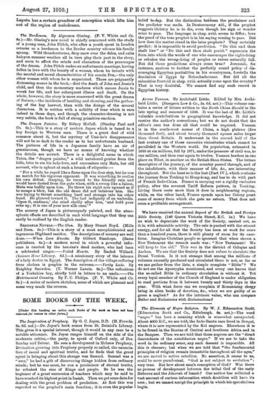SOME BOOKS OF THE WEEK.
[Under this heading me notice such Books of tha was is haw soi hese rsserved for review lat other forms.]
The Inspiration of Prophecy. By G. C. Joyce, D.D. (H. Frowde. 3s. 6d. net.)—Dr. Joyce's book comes from St. Deiniol's Library. This gives it a sperial interest, though it would in any case be a notable utterance. Dr. Joyce ranges himself on the side of the moderate critics,—the party, to speak of Oxford only, of Drs. Sanday and Driver. He sees a development in Hebrew Prophecy, Divination growing into Prophecy properly so called, the enuncia- tion of Moral and spiritual truths, and he finds that the great agent in bringing about this change was Samuel. Samuel was a "seer," he had a gift of discovering things hidden from ordinary minds; but he was more, he was a prochilmer of eternal truths, he rebuked the sins of Kings and people. So he was the beginner of a great succession of teachers which may be said to have reached its highest point in Isaiah. Then we get some data for dealing with the great problem of prediction. At first this was regarded as the prophet's main function; it is even the popular
belief to-day. But the distinction betWreen the proclaimer and the predictor was made. In Deuteronomy xiii., if the prophet suggests idolatry he is to die, even though his sign or wonder come to pass. The language in chap. xviii. seems to differ ; here the proof of the true prophet is in his saying coming to pass. But how does the matter stand in the later prophets? They certainly predict : it is impossible to avoid prediction. "Do this and thou shalt live" or "Do this and thou shalt perish" represents the form into which the words of one who encourages the right-doing or rebukes the wrong-doing of peoples or rulers naturally fall. But did these predictions always come true ? Jeremiah, for instance, anxious to further the perfectly sound policy of dis- couraging Egyptian partialities in his countrymen, foretells the desolation of Egypt by Nebuchadnezzar. But did all the eelamities foretold in chap. xviii. actually come upon the country ? That is very doubtful. We cannot find any such reoord in Egyptian history.






































 Previous page
Previous page